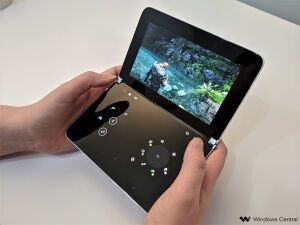No edit summary |
No edit summary |
||
| Line 11: | Line 11: | ||
== Capabilities == | == Capabilities == | ||
As a scanner and communications device, the unit is designed to handle any and all needs of a Solas Tempus officer or crew person in the field, should the need arise. | As a scanner and communications device, the unit is designed to handle any and all needs of a Solas Tempus officer or crew person in the field, should the need arise. Each display also possesses a short-range holographic emitter capable of expanding the display into three dimensions. While the emitter can provide touch feedback to objects, they are not solid. Other images can be projected using the emitters within about 24 cm or so of the display itself. A secondary more powerful holographic emitter allows the device to project a high resolution holographic image out to a distance of 4 meters from the device. | ||
=== Scanning === | === Scanning === | ||
Revision as of 00:07, 12 August 2021

The Vertex Scanner is spiritual successor to the tricorder, a scanner predominantly used by Starfleet and the United Federation of Planets. Designed by Damien Smith for Solas Tempus, the Vertex is a next generation portable computing device mixing the capabilities of a PADD, communicator, and tricorder into a single device.
- Size
- 186.9 x 145.2 x 4.8 mm (Unfolded)
145.2 x 93.3 x 9.9 mm (Folded) - Power Source
- Dual Spacial Variance Reactors
- Processor
- Dual Encapsulated Computer Cores
- Connectivity
- Subspace, Tachyon, and RF Transceivers
Configuration
The device has two distinct displays which can be folded out like a book or palm-top computer for using both displays or one folded over the other to use a single display. When not in use the device folds up and can be configured to continue scanning, maintain communications, or manage data while the displays are not in use.
Capabilities
As a scanner and communications device, the unit is designed to handle any and all needs of a Solas Tempus officer or crew person in the field, should the need arise. Each display also possesses a short-range holographic emitter capable of expanding the display into three dimensions. While the emitter can provide touch feedback to objects, they are not solid. Other images can be projected using the emitters within about 24 cm or so of the display itself. A secondary more powerful holographic emitter allows the device to project a high resolution holographic image out to a distance of 4 meters from the device.
Scanning
- VAM Enhanced Sensor Pallet
- Active & Passive Ultra High Resolution Subspace Scanner
- Active & Passive Ultra High Resolution EM Scanner
- Active & Passive Temporal Scanner
- Active IR, Visible Light, UV Image Analyzer
- Passive Audio Scanner
- Active & Passive Biomedical Scanner
- Active DNA and RNA Sequence Analyzer
Data Processing
The system is designed to handle and coordinate multiple dynamic data streams simultaneously from remote sensing, library computer access, and internal sensing systems.
- High Bandwidth Isolinear & Optical Data Processing Suite
- Bioneural Circuitry with RNA Sequence Memory Storage
- Primary ECC CPU
- Secondary ECC CPU
- Command and Control System
- Remote Piloting System
- Remote Control of Surveillance Drone Swarm (up to 64-Drone Swarm)
- Control & Coordination of Mark 1 Active Repair System
AI Usage
The device is capable of handling a Type 3 Multinodal Core, though it is not a standard component there is a dedicated slot for such a device within the unit.
Communications
The system is capable of handling multiple high bandwidth subspace, RF, and tachyon data links with multiple external computer systems simultaneously. The device can be in a passive mode, accessing remote data and displaying requested information or in an active mode where it manages and relays information between remote systems and itself. Normally the unit maintains an active data link with BlueNet to allow near-instantaneous relaying of information.